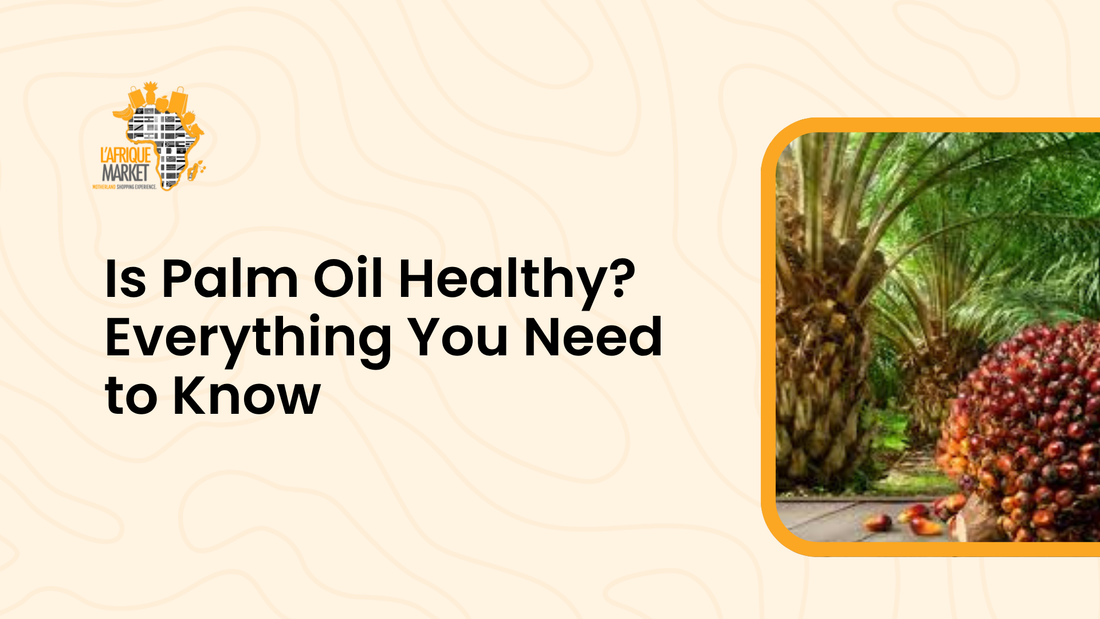
Is Palm Oil Healthy? Everything You Need to Know
Share
Palm oil. The golden red oil that glistens in your pot of jollof rice, brings richness to egusi, and makes stew hit differently. If you grew up in an African or Caribbean home, chances are your meals weren’t complete without it.
But these days, you might’ve heard some chatter: “Is palm oil bad for you?” or “Should I replace it with olive oil?”
Let’s cut through the noise. In this blog, we’ll explore what palm oil really is, its health impact, how it's used in West African cooking, and most importantly, where to find the real stuff when you live abroad.

Image from: Business Day
What Exactly Is Palm Oil?
Palm oil is an edible vegetable oil extracted from the fruit of the oil palm tree (Elaeis guineensis). Native to West Africa, it’s been used in cooking, medicine, and skincare for centuries.

Image from: foodunfolded
There are two main types:
-
Red palm oil (the one used in cooking): Unrefined, rich in nutrients, with its deep orange-red hue and earthy aroma.
-
Palm kernel oil: Extracted from the seed inside the palm fruit, more processed, often used in soaps and cosmetics.
At L’Afrique Market, we stock the traditional red palm oil that’s perfect for your kitchen — no chemicals, no shortcuts.
Also read: Food Combinations That Help You Add Healthy Weight
Health Benefits of Palm Oil (When Used the Right Way)
Here’s what palm oil brings to your plate beyond the flavor:
- Rich in Antioxidants
Unrefined red palm oil is packed with carotenoids (the same compound found in carrots), which convert to vitamin A — great for eye and skin health.
- High in Vitamin E (Tocotrienols)
Unlike most oils, palm oil contains tocotrienols, a powerful form of vitamin E that supports heart and brain health.
- Natural Fat for Energy
Palm oil is a natural source of saturated and unsaturated fats, providing energy and helping the body absorb fat-soluble vitamins like A, D, E, and K.
The Controversy: What’s the Catch?
The controversy isn’t always about the oil itself, but how it’s processed and produced.
- Highly Processed Palm Oil
The refined palm oil used in many commercial snacks (think: cookies, chips, instant noodles) loses most nutrients and may be linked to poor health outcomes.
- Unsustainable Farming Practices
Much of the global criticism comes from large-scale farming practices that lead to deforestation. But traditionally sourced palm oil from West Africa doesn’t operate that way.
The takeaway? Traditional red palm oil, when used in moderation, is both healthy and sustainable.
Why Palm Oil Matters in African Cooking
Palm oil isn’t just for color or taste, it’s foundational in many African dishes. Without it, those flavors just don’t land the same.
Here’s how it’s used:
-
Jollof rice: Adds depth, color, and a slightly smoky aroma
-
Egusi soup: Palm oil helps bind the melon seeds and gives it that rich yellow glow
-
Banga soup: The oil is literally extracted from palm fruit pulp — it’s the main base
-
Beans & plantain porridge: Adds richness and softness
-
Stew (Obe ata): Fried with tomato and pepper mix for unforgettable flavor
Where to Buy Authentic Palm Oil in the U.S.
If you’ve tried to get palm oil in the U.S., you know it’s not always easy. Some products are over-processed, diluted, or just lack that home taste.
At L’Afrique Market, we make sure you get authentic, unrefined red palm oil shipped directly to you, just like the one your mother or grandmother used back home.
Shop here: Palm Oil Collection – L’Afrique Market
Quick Tips for Cooking with Palm Oil
-
Don’t overheat it.
Heat only until it melts and begins to smoke lightly — this preserves nutrients. -
Pair it with strong flavors.
Palm oil works best with chili peppers, onions, fermented locust beans, and smoked proteins. -
Store it right.
Keep it in a cool, dark place (not the fridge!) in a sealed container.
Palm Oil Beyond the Pot
You’d be surprised — palm oil also finds its way into:
-
Natural skincare products (moisturize dry skin)
-
Black soap production
-
Hair creams for scalp health
So yes, this one oil holds down both your kitchen and your bathroom shelf!
Final Thoughts: It’s Not Just Oil.
Palm oil is more than just a cooking ingredient. It’s part of our stories, our soups, and our sense of home. Used in moderation and sourced right, palm oil is absolutely healthy, and for many of us, essential.
So go ahead, stir that palm oil into your beans, egusi, or stew, and feel good knowing you’re adding flavor, nutrients, and heritage to your plate.
